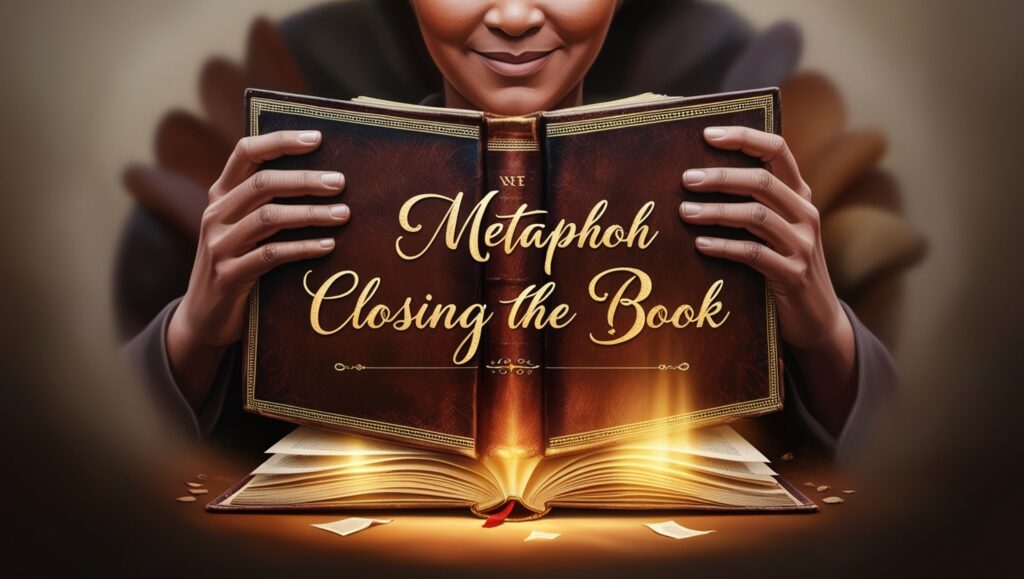Introduction
Language is not the handiest tool for verbal exchange—it’s also a replica of our internal world. Through idioms, metaphors, and symbolic expressions, we remodel complex emotions and summary reminiscences into comprehensible pictures. One such expression is the metaphor “very last the e-book.” Though reputedly clean, this word includes profound meaning for the duration of literature, psychology, personal increase, relationships, or maybe expert contexts.
To “close to the ebook” isn’t always in truth about finishing a literal text—it symbolizes a completing, selection, or preference to move on. It conveys closure, beauty, and the transition from one financial harm of life to some distinctiveness. In this entire article, we are capable of discovering the inspiration, meanings, cultural significance, and real-life applications of the metaphor “last the ebook.”
By the prevent, you could recognize now not how wonderful this metaphor technique is, but furthermore how it is able to be finished to private reminiscences, professional settings, and revolutionary expressions.
Understanding the Metaphor “Closing the Book”
Metaphors are powerful due to the truth they map familiar thoughts (like books and testimonies) onto summary human research (like closure, reminiscence, or healing). A book has a beginning, center, and prevent. Similarly, existence sports activities—whether or not relationships, projects, or journeys—have ranges. When someone speaks of “very last the ebook,” they’ll be symbolizing:
- Completion – The surrender of a monetary break or tale.
- Closure – Resolution of unfinished feelings or sports activities.
- Acceptance – Acknowledgment that some factor is over.
- Moving On – Letting pass of the past to encompass destiny.
Origins and Symbolism
Books have prolonged been used as metaphors for life and opinions. Ancient poets and philosophers defined human lifestyles as a tale written with the useful resource of future or destiny. In spiritual texts, existence activities are occasionally recorded within the “Book of Life.”
- The act of last a e-book actually have grow to be a image for:
- Finality – Just as a book ends, so too do moments in life.
- Control – Choosing to shut an ebook presents an aware desire.
- Transition – Closing one tale creates vicinity to begin each distinctive.
This metaphor has considered the fact that literature, psychology, and ordinary speech entered as a poetic manner to offer a reason behind endings and new beginnings.
Psychological Perspective
In psychology, “closing the ebook” represents the way of emotional closure. People deliver unresolved emotions, regrets, or traumas like unfinished chapters. When they ultimately devise their studies—through remedy, reflected image, or beauty—it’s as though they’ve closed the ebook on that part of their lives.

Examples include:
- A man or woman forgiving themselves after a beyond mistake.
- Someone accepting the surrender of a date.
- Letting go of grief after honoring a loved one’s memory.
Psychologists emphasize that closure is healthful. Keeping the ebook open indefinitely can bring about tension, rumination, and emotional fatigue. Closing it gives peace and readiness for emblem spanking new studies.
“Closing the Book” in Literature and Arts
Writers and artists regularly lease the metaphor of books to represent lifestyles and sports. Some examples:
In novels, characters also can truly be near an e-book to symbolize shifting on from a painful past.
- In poetry, the very last e-book represents finality and know-how received.
- In films, characters on occasion P.C Away books or journals on the stop in their journey, symbolizing recognition.
Metaphorically, the act isn’t about loss—it’s about honoring a tale, studying from it, and letting it rest.
Applications of the Metaphor
1. In Personal Life
- Ending a toxic friendship: “I’ve closed the e-book on that bankruptcy of my existence.”
- Healing after a breakup: “It’s time to shut the ebook and start sparkling.”
- Letting circulation of remorse: “I’ve closed the e-book on my beyond errors.”
2. In Professional Settings
Completing an extended-time period challenge: “We can ultimately near the e-book on this 365 days’ file.”
- Finishing a profession section: “After 30 years, she closed the ebook on teaching.”
- Resolving a dispute: “The enterprise organisation agency closed the e-book on jail battles.”
3. In Spiritual or Philosophical Contexts
- Life and loss of lifestyles: “At the end of life, we near the ebook on earthly lifestyles.”
Karma and gaining knowledge of: “Each lesson determined lets us shut the ebook on lack of information.”
- Renewal: “By finalising the ebook on the day before today, we make room for the following day.”
Symbolic Variations of the Phrase
The metaphor can be tailor-made in masses of paperwork:
- “Closing one e-book, commencing each unique” → Endings deliver new beginnings.
- “Half-closing the e-book” → Unresolved issues live.
- “Closing the incorrect e book” → Letting pass in advance or preserving off instructions.
- “Closing the e-book for all time” → A very last finish, regularly tied to mortality.
Each version offers nuance to how we apprehend closure.
Cultural Perspectives
Different cultures use similar metaphors:
- Japanese way of lifestyles – Life degrees are visible as seasons, however the e-book metaphor additionally resonates in literature.
- Western manner of lifestyles – Strongly tied to Christianity’s “Book of Life” and literary symbolism.
- Middle Eastern traditions – Closing the e-book is associated with destiny and divine file-retaining.
The universality of this metaphor proves how deeply human beings are a part of books with the idea of existence’s narrative.
Metaphor vs. Literal Meaning
It’s crucial to distinguish between literal ebook closure and metaphorical closure. A literal e-book ends at the same time because of the reality the reader stops analyzing. A metaphorical ebook ends even as a person chooses to allow skip emotionally, mentally, or spiritually.
Thus, the metaphor emphasizes corporation organisation—selecting to save you revisiting the past.

Why the Metaphor Resonates
- The metaphor “final the ebook” is powerful because of the reality:
- It is relatable – Everyone is aware of books and reminiscences.
- It is time-venerated – Cultures internationally use it.
- It is emotional – It consists of weight and imagery.
- It inspires renewal – Suggests desire for destiny.
Common Misconceptions
Some humans misread “final e-book” as forgetting or erasing the past. In fact, it doesn’t advocate forgetting—it means acknowledging and accepting the tale at the identical time as now not residing on it.
Examples of Use in Sentences
After years of treatment, John ultimately closed the ebook on his youth trauma.
She was determined to shut the ebook on her failed commercial business enterprise organisation and begin anew.
- The government closed the e-book on the research after carrying out an agreement.
- For Maria, graduation intended to close the ebook on her scholarly life.
- Closing the ebook on resentment allowed him to forgive and bypass earlier.
- Life Lessons from the Metaphor
The metaphor teaches us:
- Life is a story with many chapters.
- Endings are natural and critical.
- Closure brings peace and growth.
Each finishing is a prelude to an extremely-modern-day beginning.
MCQs Metaphor Closing the Book :
1. What does the metaphor “last the ebook” in trendy signify?
A) Forgetting the beyond absolutely
b) Completion, closure, and shifting on
c) Avoiding obligations
d) Reading a new story
Answer: b) Completion, closure, and shifting on
2. Which of the following is NOT associated with the metaphor “remaining the book”?
A) Acceptance
b) Transition
c) Beginning a cutting-edge assignment
d) Endless rumination
Answer: d) Endless rumination
3. In psychology, “final the ebook” frequently refers to:
a) Memorizing beyond errors
b) Emotional closure and recuperation
c) Avoiding painful recollections
d) Writing new chapters in a literal e book
Answer: b) Emotional closure and recuperation
4. Which phrase variant suggests that unresolved issues nevertheless continue to be?
A) Closing the wrong ebook
b) Half-very last the ebook
c) Closing the ebook forever
d) Closing one e-book, opening every different
Answer: b) Half-very last the ebook
5. How is “remaining the book” regularly utilized in expert settings?
A) To express a preference to forget about approximately paintings absolutely
b) To describe finishing tasks or resolving disputes
c) To advocate starting a brand-new organisation
d) To discuss with reading corporation manuals
Answer: b) To describe completing projects or resolving disputes
6. In literature and humanities, last a ebook is often used to represent:
a) Avoiding obligations
b) Finality, facts, and beauty
c) Escaping reality thru reading
d) The literal act of reading quicker
Answer: b) Finality, expertise, and reputation
7. Which cultural manner of lifestyles strongly connects the metaphor with the “Book of Life”?
A) Middle Eastern traditions
b) Japanese lifestyle
c) Western/Christian traditions
d) African oral traditions
Answer: c) Western/Christian traditions
8. Which of the following is a misconception about the metaphor “very last the e-book”?
A) It way closure and shifting ahead
b) It manner forgetting or erasing the past
c) It shows emotional reputation
d) It symbolizes transition
Answer: b) It technique forgetting or erasing the past
9. Which sentence correctly uses the metaphor?
A) “After years of treatment, she ultimately closed the ebook on her painful recollections.”
b) “He closed the ebook on his table to begin analyzing again.”
c) “They closed the e-book due to the fact that the library has come to the very end.”
d) “She closed the ebook to avoid analyzing in addition.”
Answer: a) “After years of remedy, she ultimately closed the book on her painful reminiscences.”
10. What most vital life lesson does the metaphor teach?
A) Endings are unnatural and must be averted
b) Closure hinders growth and renewal
c) Life is a story with many chapters, and closure brings peace
d) Forgetting the beyond is the first rate way to heal
Answer: c) Life is a tale with many chapters, and closure brings peace
Final Words : The Power of “Closing the Book”
The metaphor “final the ebook” includes timeless recognition that reaches beyond clean language—it’s far a reminder of tactics people enjoy endings, machine feelings, and encompass new beginnings. Life, like an e-book, is crafted from chapters: some thrilled, a few painful, however all essential to the story we name lifestyles. To be near an ebook does no longer recommend to erase its content material fabric cloth; instead, it manners acknowledging its fee, accepting its instructions, and deciding on not to stay and no longer the use of a result in sight on what has already been written.
From an intellectual lens, finally the ebook offers healing and launch from unresolved emotions. In literature and the humanities, it gives richness and depth to memories’ approximately transformation. In personal and professional lifestyles, it offers a symbolic manner to give a reason behind shifting on—whether or no longer or no longer from failed relationships, finished tasks, or beyond regrets. Spiritually, it teaches us to view life as a sacred narrative, wherein every completing prepares the ground for a cutting-edge starting.
Importantly, this metaphor resonates universally due to the truth it is deeply relatable: absolutely everyone has an expert in a 2d in which they had to place the past in the lower returns of them. Its cultural presence in the course of traditions proves how universally human this need for closure virtually is.
Ultimately, the metaphor conjures up desire. It teaches that closure isn’t always approximately forgetting—it’s far approximately freeing ourselves to boom. Each time we close one ebook, we open the opportunity of a few others, complete with easy pages prepared to be written. And in that act lies the beauty of renewal, resilience, and human improvement.
Read More About Metaphor At Hitl mila
